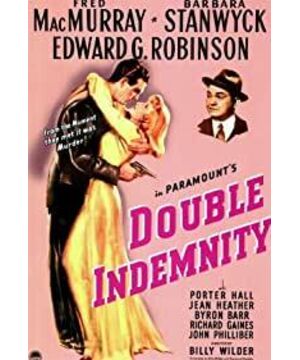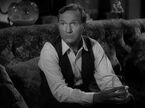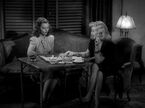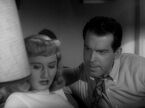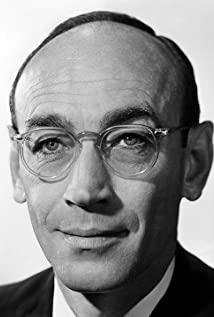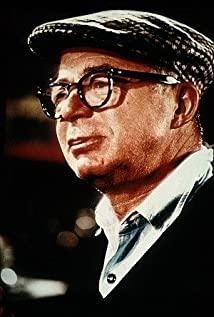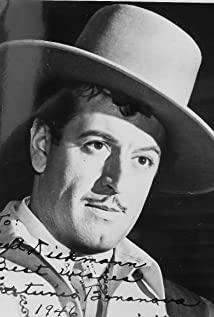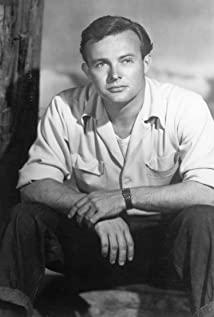Double Indemnity
Double Indemnity
Rating: 8/10
Publisher: USA 1944
Director: Billy Wilder Billy Wilder
Screenwriter: James James M. Cain M. Cain (author of the original novel)
Raymond Chandler
, Billy Wilder, Billy Wilder,
actor: Fred McMurray, Fred MacMurray (Walt
Naffer ), Barbara Steinwell Barbara Stanwyck (Phyllis)
Edward Robinson Edward G. Robinson (Case)
John Heather Jean Heather ..... (Laura)
Tom Bauer Tom Powers ..... (Di Trixon)
Porter · Howl Porter Hall (Jackson)
Length: 107 minutes
Genre: Crime, Black
Premiere: September 6, 1944
[Story] In the
1940s, the fallen black and white Los Angeles.
Walter Nefer is a very decent bachelor and an excellent 36-year-old insurance company salesman. One day, after dealing with the business at hand, he suddenly remembered that he should renew the insurance for two cars with an important customer, so he stopped by the car dealer Di Trixon's luxury villa in Beverly Hills. Mr. Dietrichson was not at home, and he was entertained by a beautiful young woman. Mr. Dietrickson's second wife, Phyllis, looked at each other and immediately wiped out the sparks of desire. The two agreed to see you at three o'clock in the afternoon the next day.
The next afternoon, Water couldn't wait to come to the villa, and he found that only Phyllis was at home alone. The two were chattering and restless, but on the surface they were still talking about Mr. Dietrichson's insurance. Phyllis asked Walter, if she plans to buy an insurance for her husband in private, how can she get the maximum amount of accidental injury compensation? Walter keenly sensed that the restless blond woman was planning to use her hand to murder her husband, so she left angrily. But the whole afternoon he was very unhappy, a terrible thought and a charming figure tortured him at the same time. It started to rain in the evening, and Phyllis suddenly came to Walter's apartment. This time she was very direct. The two hit it off. After a rush of closeness, they immediately began planning the murder. Soon, Walt got Dickson's personal accident insurance, he slipped the insurance policy into a lot of car insurance, and Dickson signed the contract without knowing it. The next task is to commit murder. The insurance companies of that era had a weird rule that the victim would receive double compensation for any accidental death on the train, and the two conspirators would not miss such important details.
This seamless plan of killing was like this: A few days later, Dietrichson was going to travel on a business trip. He happened to have broken his leg, so he had to take the train. Walt would hide in the back seat of Dietrickson’s car beforehand, and Phyllis would turn the car into a secluded place while driving her husband to the train station, where Walt strangled him to death with a tie and then replaced it. DiTrixon’s clothes pretended to be him on the train. He will be very careful to impress the conductor without seeing his face, and then he will risk jumping off the train from the back of the train when people are not paying attention, and then help Phyllis waiting there to put Di Trixon’s body away. On the railroad tracks, causing the illusion that Di Trixon accidentally fell off the train and died. Of course, he will use the concierge very carefully to create evidence of his absence. Things went very smoothly. Although he met a nagging person on the train, he cleverly got rid of the guy named Jackson.
Next, Walter and Phyllis had to pretend not to know each other at all, and then quietly waited for the money to arrive. The police’s preliminary judgment was in full compliance with Walt’s design, but the insurance company owner Norton suspected that Di Trixon had committed suicide. Walter’s old partner Keith had a fierce debate with Norton in front of Walter. He insisted that Di Trixon was Suddenly died, Walt, who stood on the side with a panic, was finally able to let go of his long-hanging heart. In the evening, Walter received a call from Phyllis and she was about to come to Walter's apartment-they couldn't wait to taste the fruits of this victory. But just before she arrived, Case made a sudden visit, and he had new ideas about the case. He suspected that this was neither an accident nor a suicide, but despite his doubts, he still did not come to a final conclusion. Phyllis rushed in happily. Fortunately, she heard the conversation inside before knocking on the door, and hid behind the door in time, otherwise it would be a terrible gangbang! After that, she and Walt became more and more cautious when meeting with Walter. However, Walter underestimated the logical reasoning ability of her old friend Case. With years of experience in insurance agency, he actually inferred the detailed process of the entire murder accurately. He even found Here came the Jackson who had had a conversation with the fake Mr. Dietrichson on the train. Jackson confirmed that the person on the train was not the dead Dietrichson. They just didn't know that the murderer who conspired with Mrs. Dietrichson was standing by their side.
Walt was startled in a cold sweat, and at this time he heard this story from Dickson’s daughter Laura: Laura’s mother, who was Dickson’s first wife, was actually the nurse who was looking after her at the time. She was deliberately murdered. Although there is no evidence, she witnessed the situation with her own eyes, and the nurse later became her stepmother-Phyllis is not a simple lonely woman, she is a femme fatale who is accustomed to using men, Wo Te finally realized this soberly. At this time, Phyllis had frequent contact with Laura’s boyfriend Nino. Case suspected that Nino was her murder accomplice, and Walter realized that this Nino was probably the one that Phyllis had come to deal with. . He decided to start!
That night, in the Spanish-style living room where the two met for the first time, Walter and Phyllis had one last conversation. What Watwan never expected was that when he was about to kill Phyllis, the other party was also ready to get rid of him. Walt closed the living room windows one by one. He didn't want Phyllis's screaming to be heard by the neighbors, but when he turned around, Phyllis suddenly fired a shot. The bullet hit Walt's shoulder. Walt walked towards Phyllis. Phyllis threw the gun and hugged Walt. She said: I can't bear to take a second shot. With two gunshots, Phyllis died in Walter's arms.
Water bumped into Nino, who had come to date Phyllis outside the house. For some reason, he didn't frame the man, but asked him to call Laura to help him get rid of the right and wrong. Then, Walt stumbled back to his office, made the last long call to Case and told him in detail all the absurd things he had done during this time... When Case arrived, he had already Exhausted, Case lit a cigarette for him, he took a puff, then closed his eyes.
【Appreciation】
After watching it, I have been thinking about the biggest difference between this movie and Billy Wilder if it were filmed by Hitchcock? I think these two imaging sociologists who are well versed in the world are not very different in essence, except that Hitchcock has more boredom and anxiety in his heart, and Billy Wild is not like Hitchcock. Ke is so obsessed with criminal psychology. Finally, I finally figured out two points. First, if Hitchcock came to the film, he would probably appear as an inconspicuous train passenger in the film, and the camera would sweep his cigar smoking big fat. Face, but will not stay for a second; second, he will not use the first-person narrative method to explain the story. The biggest advantage of Billy Wilder’s first-person narrative is that it facilitates the detailed outline of all the subtle psychological changes of the protagonist Walt’s crime, and ultimately makes the film a relatively complete history of the soul of a fallen man, while Hitchcock’s Will choose to spend more pen and ink on that woman. He will let the camera dissect the motive of the blonde beauty's murder like a scalpel, and let another blonde beauty, her stepdaughter Laura, also get involved in this dirty murder case. Laura may be stabbed to death in Walt's bathroom with scissors. She should be more sexy, or at least should have a little bit of mental and physical lingering with Walt, not like now. , And Walt maintained an ambiguous relationship like a relative.
The 1940s was the era when American film noir became popular. Compared with the idealistic optimism of "The Man in the Wind", more Hollywood filmmakers tried to explore and express in this period, but it was precisely the time that "Man in the Wind" was eager to eliminate. A great sense of disillusionment in people's minds. Film noir looks at the American reality before and after the war more calmly and indifferently. They even portray Los Angeles as a cruel, cold and dark world-"Hollywood's lights dim, the characters are more degenerate, the theme is more fatalistic, and the sentiment is more pessimistic. By 1949, American cinema had entered its deepest and most triggering throes. Films before that had never dared to take such a derogatory look at American life, and for the next two decades, they never dared to do that again. ." (Paul Schrader). And Billy Wild’s "Double Compensation" is said to be an important bridge between the early and subsequent noir films, because at that time the film was almost used by Paramount Corporation, Hayes Office, and the film’s male number one. Superstar Fred McMurray worked together to ban the distribution, but three years later, similar films were shipped from the production line of the studio in batches.
In Hollywood at the time, it took great courage to shoot movies like "Man of the Storm" and "Double Compensation". The former needed to overcome the superficiality of romantic comedy movies, while the latter needed a more perfect story, unfortunately. Yes, at this time Billy Wilder and the screenwriter of the film, the famous mystery writer Raymond Chandler have a bad relationship. Although they admire each other's talents very much, they often can't live in the same room. Raymond Chandler is a great mystery novelist as well as an excellent screenwriter. He has written countless excellent screenplays for Hollywood throughout his life, and has been nominated for Oscars twice for this reason, and coincidentally, he and Billy Wilder and Hitchcock have worked closely together, but his arrogant and immortal character has always been incompatible with the rules of the Hollywood game, which eventually led to his parting ways with the two world film masters. Film noir, especially the creators represented by Raymond Chandler, often like to portray the male protagonists in film noir into non-hero characters. Their destiny is irreversible, and they always move in the dark direction. Little by little slipped. In "Double Compensation", Walter, an insurance company employee, was originally a sober-minded and cautious man. He has good performance and reputation and excellent partners, but he lacks future and hope in life. For more than ten years He has never gotten a chance for a promotion, he has experienced a failed marriage, and now he is living alone in a single apartment with complex terrain. This is the reason why he was impulsive the first time he met Phyllis, and it was also the reason why he was able to transform from a gentleman to a murderer with a little encouragement. He devoted himself so quickly, and there was almost no turning point. It can only show that it is not just the woman with golden hair that attracts him. He is not even a man worthy of sympathy? When he killed Phyllis in an orderly manner, without hesitation, without the slightest pity, it means that the so-called "love" between them was extremely fragile from the beginning, but an impulse that could not be suppressed under temptation. That's it.
Walt is really a very black character. There are two completely different personalities in him. One is an upright American who can always light up cigarettes for friends and lovers in time, and the other is for money and women to be able to throw away immediately. A murderer who takes risks. However, this guy is an out-and-out tough guy. He is decisive, calm and sophisticated, even after being shot, he can distinguish his interests and disadvantages. He sent Nino, who had been caught in the net, and drove back to the company personally. He chose to stay here. The place where he struggled for half his life, instead of calling an old friend at home or on the street, showed his yearning for returning to the right path. However, he finally refused to bear the consequences and chose to die. This is really a tragic character through and through, representing the most reliable and pathetic fate that a man may have in his life.
Phyllis is the kind of woman we often see in American movies, and even similar stories such as "The Postman Always Rings the Bell twice" are almost exactly the same women. These women with an empty heart and a clear purpose, their motives for killing are always innate. It seems that "weariness" alone can constitute the most sufficient reason, tired of a rich but ruthless husband, tired of a lifeless town, Tired of a uniform life... They can always find the most suitable and shrewd murder partner, and get an extra compensation while getting rid of a life that tires them (husband). However, the ending is always tragic, it is counterproductive, they kill the people who should be killed, but also kill their own future. This may be especially common in murder movies of the last century-at that time, women had limited choices for a new life after they walked out of the house. However, a woman like Phyllis always feels ambivalence. If she insists on shooting Walt a second time, we might be able to treat her more calmly and assume that she is a prostitute, but she happens to be. At that time, she showed a trace of precious favor, which is different from the real femme fatale, those cold-blooded women who kill people without blinking. In her, she may also have some kind of dual personality, just her motive. The damn screenwriter Raymond Chandler did not give enough supplementary materials to prove it, which makes this character always feel a little disgusting. thin.
This is a movie with clear clues and full of emotions. The music always reveals a flustered mood, and the rhythm is getting faster and faster. It avoids the too trivial shots that frequently appeared in Hollywood sex movies in the late 1990s. In a succinct and humorous narration by the male protagonist, many changes can occur continuously, which is really rare in the technique of film language. Billy Wild doesn’t like to show off his film skills, but he pays great attention to nurturing the details in the shots, such as the matches in Walt’s hand. This guy smokes most of the film, and he uses matches, and Always lit a cigar for his friend Case, and for the last time, when he was sitting weakly on the ground, ready to enjoy the last cigarette in his life, he could no longer strike a match as accurately and smartly as before. , But Case lit a cigarette for him. This vivid detail has been retained until the end of the film, and the nostalgia and regret bred in it can only be felt by the audience outside the screen.
The United States in the 1940s was a United States full of boredom and lack of indulgence. People did not like to ask about the meaning of existence, but this question was always entrenched in their hearts. The economic depression in peacetime and the psychological imbalance during the war. This long and powerful double blow has made the naive Americans no longer blindly look forward to the future, and simple imagination cannot fill their daily lives. The film also needs a more subtle tone to express this loss and frustration. "Double Compensation" is a good specimen of reality, and the truth is buried in the fiction. That is the lingering breath of Hollywood in a certain period. Compared with contemporary America, this simple and profound feeling of boredom has become more diverse. Think about the most classic "Seven Deadly Sins" or the least classic "Elephant"... everything What is the fundamental motive of the deliberate murder? Tired, there is no doubt about it.
http://oblog.odineast.com/more.asp?name=sixdoors&id=2067
View more about Double Indemnity reviews


